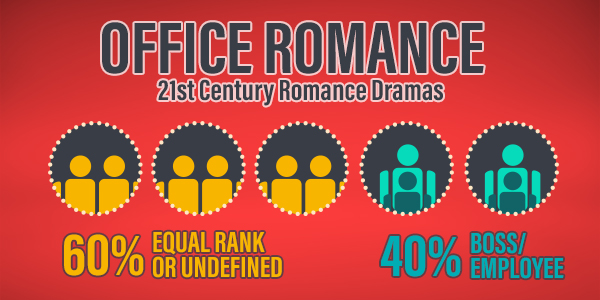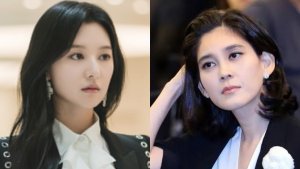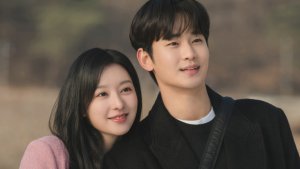 A Tag Analysis: Romance in K-Dramas - Conclusion
A Tag Analysis: Romance in K-Dramas - Conclusion
INTRODUCTION
Welcome to the second part of the "Analyzing Tags" series. Like previously mentioned, I partnered up with @Lua for this enterprise. For those who haven't read the first installment, I highly recommend you do even if it's not necessary. As a reminder, this handy table below shows the structure we're following:
Analyzing Tags: Romance in K-dramas | |
| PART ONE (read here) | Will give an overview of the Romance genre and focus on the formulas used in K-dramas and how we can interpret them within the genre. Specifically, we'll go over the following tags: "Love Triangle", "Lead Chasing" and "Age Gap". |
| PART TWO (current article) | Will continue the analysis of the formulas used in K-dramas. Specifically, we'll go over the following tags: "Office Romance", "Boss/Employee Relationship", "Cohabitation" and "Childhood Connection". |
| PART THREE | Will focus on the tags related to the characters; specifically how we tag a female lead vs a male lead when it comes to Romance. In addition, we'll also cover the "friendship" tag which includes: "Bromance" and "Sismance". |
Like with the previous article, here are some things to keep in mind:
| When we talk about... | We mean... |
| *Our compiled list of Most Popular and Highest Rated dramas... | The list is composed of 28 Recent Dramas (2015-2018):
|
| **21st Century Dramas | Completed dramas from 2001 to March 2019. |
| *Recent Dramas | Completed dramas from 2015 to March 2019. |
| **Fairly Recent Dramas | Completed dramas from 2018 to March 2019. |
| *Selected Genres... | Since there are too many genres, when we talk about selected genres, we're tallying the dramas under the following genres: Detective, Thriller, Investigation, Romance, Drama, Comedy, Melo, Suspense, Action, Law, Psychological, Mystery, Supernatural, Fantasy/Sci-Fi, Historical, Friendship, and Life. |
With that settled, let's jump into part two, shall we?

TAGS & CONTENT
The idea behind this article is to find the most used formulas within romance dramas through an analysis of the tagging system. We've already covered some popular plot-devices/settings in part one, but there are still others we've yet to cover that we tend to see quite often.
So let's kick this off by exploring a recurrent scenario within the Romance genre...
OFFICE ROMANCEHOW OFTEN DOES | ||
 | ||
9.9% of the *Recent Romance Dramas are tagged with "Office Romance", which means 1 out of 10 romance dramas unfolds in an office. | ||
Overall, only 64 Dramas from **21st Century have been tagged as "Office Romance". | ||
 | ||
 |  |  |
It's important to point out that dramas tagged with a "Boss/Employee relationship" will not always feature an "Office Romance" tag. This makes sense when we consider that "Office Romance" has been defined as:
"A romance that occurs in an office setting."
Oh My Ghostess (2015) | Wok of Love (2018) |
 |  |
So dramas like Oh My Ghostess and Wok of Love, which portrays a romance that unfolds in a restaurant, are exempted from the tag despite conceptually being an office romance (a romance between co-workers or a romance in the workplace). However, since these examples feature a Boss (the ML) who falls in love with his employee (the FL), they are appropriately tagged with a "Boss/Employee Relationship". | |
And these types of scenarios are at the heart of the discrepancy in numbers when we compare these two tags. However, it’s worth noting that there are still exceptions to the rule, with dramas tagged as "Office Romance" despite the story not technically unfolding in an office setting.
Just Between Lovers (2017) | |
 | Just Between Lovers is one such example. Our leads reunite as co-workers and begin building a relationship through a shared project. However, Ha Moon Soo (the FL) is actually a freelance designer hired to help with a construction project. While Lee Gang Doo (the ML) is a construction worker who ends up getting partnered up with Moon Soo to work on a memorial side-project. Though they don't share an office, they are temporary co-workers of sorts which might explain why the drama was tagged as an "office romance". |
Since we've already made the distinction between the tags, let's take a look at the "Boss/Employee Relationship" data.
BOSS/EMPLOYEE RELATIONSHIPHOW OFTEN DOES A BOSS DATE AN EMPLOYEE? | ||
 | ||
Only 6.8% of the *Recent Romance Dramas are tagged with a "Boss/Employee Relationship". | ||
| From the **Fairly Recent "Office Romance" Dramas... | From our compiled list of the Most Popular and Highest Rated dramas*... | **From the "Boss/ Employee relationship" dramas... |
 |  |  |
 |  |  |
A good number of dramas with a "Boss/Employee Relationship" do not unfold in an office setting.
Oh my Venus, for example, falls within the "Boss/Employee Relationship" because the ML has been hired as the FL's physical trainer. Same situation with The Beauty Inside and, to some extent, with Devilish Joy. In the former, the ML hires the FL as his company's brand ambassador/model. In the latter, the ML is practically the owner of FL's agency. Yet neither of these dramas take place in an office setting and, as such, are exempted from that tag.
Terius Behind Me (2018) | |
 |  |
And let's not forget Terius Behind Me who shakes things up by having the FL employ the ML as her children's nanny; regardless of the ML's ulterior motive for accepting the job. | |
Of course, the "Boss/Employee Relationship" also has some limitations, since it's been defined as:
"When a lead is in a relationship (romantic or otherwise) with their superior at work or their employer."
Which means non-romantic relationships can be tagged as well. And though one could try to circumvent this issue by filtering out the non-romance genre dramas, a few exceptions might still slip by.
Legal High (2019) | |
 |  |
Legal High is one such drama. Go Tae Rim (the ML) is Seo Jae In's (the FL's) boss; however, there's no romance between them. Instead, we get a secondary couple who works in the same office and eventually gets together, which is why the romance genre gets applied. Interestingly enough, in regards to this couple, Min Joo Kyung (the 2FL) actually outranks Yoon Sang Goo (the 3ML). | |
This introduces an interesting observation, which is that there's a bigger chance of having the secondary couple establish the woman as the boss/more successful/higher in status than the man. Whereas with the main couple, the writers will almost always position the man as the boss/better off or put him in a position of power over the Female Lead. The Beauty Inside, The Master's Sun, and King2Hearts perfectly illustrate both of these points.
Another scenario we tend to see, perhaps even more prominently, is for the secondary couple to be of equal rank while the main couple has a boss/employee relationship. Recent examples of this scenario include: What's Wrong with Secretary Kim, Devilish Joy, Suspicious Partner, and Touch Your Heart, to name a few.
So most dramas will establish the ML as the FL's Boss.
Which correlates with the belief that manhood is defined, tied and measured by a man's financial stability. Dramas go one step further by measuring the male lead's worth based on how much money he can spend on the FL -- establishing that lavishing them with gifts is an appropriate and important part of the wooing process.
Since we'll expand further on this point on Part 3, we'll leave the subject alone for now. In the meantime, let's move onto the next part!
COHABITATIONWHO HOLDS MORE POWER? | ||
 | ||
Only 53 Romance Dramas from the **21st Century have been tagged with "Cohabitation". | ||
Though that percentage may seem low compared to the number of Romance titles added to MDL on a yearly basis... once we broke down the numbers, we realized that many dramas prior to the implementation of the tag system haven't been tagged.
So we decided to focus on the *Recent and **Fairly Recent Dramas for this particular trope. Not only did we increase the chances of finding tagged dramas by doing this, but we were also able to analyze each tag since we've both watched a significant number of dramas within that time frame.
One of the things that stood out is how writers used cohabitation as a conflict first and foremost. Unfortunately, the plot device seems to treat the genders quite differently -- with female characters usually getting the short end of the stick.
Let's look at some numbers to give you an idea of what we mean:
 |  |
Overall, around 70% of the dramas tagged with "Cohabitation" portray the male character in the position of power. | |
Which means that 3 out of 5 dramas will show a scenario where the Female Lead ends up moving into the Male Lead's residence. Which, of course, means he will have more power than her. Adding salt to injury, most of those times, the FL will be shown to be in a highly desperate situation. Let's briefly go over a few dramas where we see two basic things happening:
- The Female Lead is portrayed in a desperate state and/or a life crisis which forces her to seek refuge in the Male Lead's house.
- The Male Lead is financially stable and in no crisis. Which means has more power/authority over the house and, to an extent, her life.
 |  |
|
|
 |  |
|
|
As you're probably aware, this is an absurdly small sample of this type of scenario, where cohabitation is introduced as the heart of the show but in favor of the Male Lead. I'm sure we've all seen our share of Male characters becoming the Female Lead's "knight in shining armor". And while the archetype is quite popular for a reason, it's hard not to see how some of these stories rely on the imbalance of power to build their "romance".
Just think about how most of those stories wouldn't work unless the ML was absurdly kind and a complete gentleman. In real life, however, I think we can agree many of these women would have been taken advantage of. And it's the fact that we're relieved and appreciative when the MLs don't exercise their power that makes it even sadder because that's a very low bar to hold men to. But, again, just because they didn't use that power doesn't mean it doesn't exist.
Of course, notable exceptions can be found where the writers include a situation which creates a balance of power between our main leads.
Jugglers (2017) | |
 | This drama comes to mind when I think of a clever balancing act (pun intended). Jwa Yoon Yi (the FL) may be Nam Chi Won's (the ML's) secretary at work, but she's his landlord at home. The peculiar situation enables each character to hold power/authority over the other at different times; enabling the development of a balanced relationship where a healthier romance can blossom. |
As of April 17, four 2019 dramas have been tagged with "Cohabitation". Two dramas (Love in Sadness & Romance is a Bonus Book) gives the Male Lead power over a very desperate Female Lead. Another drama (My Fellow Citizen) shows both leads sharing equal power. With the remaining drama (The Crowned Clown) hard to define given that neither character has absolute power over the other. Instead, you get a group of people (since we're talking about politics here) having power over both of them. Though you could argue the ML has slightly more power or authority over the FL.
From our compiled list of the Most Popular and Highest Rated dramas*... | |
 |  |
28.5%have been tagged with "Cohabitation". | 87.5%place the male in the position of power. |
Now, this doesn't always mean that whoever moves into the other's house has less power or authority. At times we may get dramas that aren't as clear-cut. Yet, despite trying to be different (sometimes even edgy), the writers still somehow manage to endow the Male Lead with more power over the Female Lead and/or over the situation they're in.
I Picked up a Star on the Road (2019) | Witch's Love (2018) |
 |  |
Even though this drama pokes fun at the "Stockholm syndrome" by having an office worker drowning in debt (the FL) kidnap a successful and rich top star (the ML), the writers still give the latter more power. Sure, you could argue that the FL has the ML literally chained at home. Yet, rather than a hostage, he becomes her master; demanding she provides him with the kind of life he's used to. Which means that in an absurd twist of fate, the FL ends up slaving herself and accumulating more debt in order to get him quality food, drinks, and clothes to keep him satisfied. What's more, she ends up eventually moving into his much grander his house, where he's given even more power over their situation and, therefore, her life. | In this drama, a successful and young CEO (the ML) tries to rent a room on the upper level of a building which holds a popular restaurant run by the FL's family. The reason why the ML wants to move in is to solve a mystery regarding his childhood. The FL and her family, however, turn him down since they are actually witches who can't afford someone butting into their lives. Unwilling to back down, the ML buys their building and moves into one of the rooms. When they demand he stays out, he threatens to evict them. So even though he's not allowed to wonder as he pleases into the restaurant and he's treated quite coldly at first, he still holds power over the three women. |
I'm especially interested to hear everyone's thought regarding this matter, so don't forget to share them in the comments down below. Having said that, let's move on to the final section of this article...
CHILDHOOD CONNECTIONHOW OFTEN DO OUR PROTAGONISTS SHARE A PAST? | ||
For this article, we're including in the umbrella term of "Childhood Connection" the following tags: Childhood Friends, Childhood Acquaintance and Childhood Love. | ||
 | ||
Only 5.8% of Romance Dramas from the **21st Century have a Childhood Connection tag. | ||
However, the percentage increases to 11% (almost double the amount) when we consider only the *Recent Romance Dramas. The number jumps to 12% when we filter through the **Fairly Recent Romance Dramas.
In other words, 87.7% of the dramas tagged with Childhood Connection were aired during the **21st Century. From those Romance Dramas, 76% are *Recent Romance Dramas & 35% are **Fairly Recent Romance Dramas. (Btw, curiously enough, Doubtful Victory (2017) is the only show which has all three childhood connection related tags).
The fact that 2018-2019 makes up such a big percentage of the numbers imply that many dramas may not have been tagged.
This basically means that approximately... | ||
 | ||
…as part of the story. | ||
Also, it's important to keep in mind that these childhood tags don't necessarily refer to the main leads. As we've established before, the tag implementation differs from user to user. The only guide we have for certain is the description of each tag. So let's take a look at how each has been defined by the within MDL's system:
- Childhood Friends | When two characters were friends in their childhood.
- Childhood Acquaintance | Portraying characters who knew each other, but were not friends, in their childhood.
- Childhood Love | No description. ლ(ಠ益ಠლ)
Ignoring the fact that "Childhood Love" hasn't been given a description yet, the other two tags have been described vaguely. This means that dramas like The Beauty Inside have been tagged with "childhood friends", despite the two leads not knowing each other from childhood. Instead, the tag refers to the relationship between the FL and her two best friends.
This might likewise explain why some dramas have been tagged with both "Childhood Friends" and "Childhood Acquaintance". Although when to choose one over the other to describe a particular relationship can also differ from user to user.
Let's take While You Were Sleeping as an example. I tagged the show with "Childhood Acquaintance" BUT took off "Childhood Friends". That's because we're never shown the two leads having/building a relationship past their initial meeting during their fathers' funerals. Yes, they shared a traumatic experience that changed them drastically, but the simple fact that the ML assumed and believed the FL was a boy proves they weren't friends, just acquaintances.
Of course, others might judge that relationship as a friendship despite the lack of a shared experience besides what happened the day they met. Just how in real life we regard, judge, define and value relationships very differently; so too might we see a drama very differently from each other. That's both the beauty and difficulty (some can be very sensitive) when it comes to debating a subject.
At any rate, let's break down the numbers that compose the "Childhood Connection" concept:
CHILDHOOD CONNECTION RELATED TAG USAGE | ||
9 DramasFrom the *Recent Romance Dramas have been tagged with Childhood friends + Childhood acquaintance. | With an 82.27% usage, "Childhood Friends" is the most popular Childhood Connection related tag. | 7 DramasFrom the *Recent Romance Dramas have been tagged with Childhood Friends + Childhood Love. |
 |  |  |
And that's it for this subject and, as it stands, with this article!
BTW, I apologize for the length and the time it took to write this installment, especially when I expressed in the comments it was almost done back when Part 1 was published. Unfortunately, I (3GGG) became extremely busy and haven't had as much time to spare during the last couple of weeks (and probably won't have for a while ╮("╯_╰)╭ ).
Regardless, I hope the waiting was worth it and that you enjoyed the article! Don't forget to leave your comments down below and get a conversation started!
PS: In case anyone is curious, here's our... *Compiled List of Top Rated and Most Viewed (2015-2018). We're marking with red the ones with a romance genre.
*Compiled list of the Most Popular and Highest Rated Dramas | ||
Year | Most Popular (Viewed) | Highest Rated |
| 2015 | ||
| 2016 | ||
| 2017 | ||
| 2018 | ||
Thank you for reading this article! We'd love to hear your thoughts in the comments down below. Here are some questions to get a conversation started:
- Did you enjoy the article?
- Did you also read the previous article? If so, have you tagged any dramas?
- Was there a subject covered in this article which interested you? If so, which one?
- Do you agree or disagree with our interpretations?
- Which data did you find most surprising?
- Have you watched a lot of office romances? What do you like the most about them?
- Have you seen dramas where the female lead is the male lead's boss? If so, which ones?
- Have you ever notice the power balance portrayed in the relationship between the leads?
- Can you think of dramas where the writer has given the female character more power/control than the male character? If so, which ones?
- Can you think of more dramas -- besides the ones mentioned in the article -- where the writer gave the male lead a significant amount of power over the female lead?
- What do you think of cohabitation in dramas? Do you agree that most times the male has more (if not all) the power when it comes to this scenario?
- Have you ever seen a drama where the male is in a crisis and seeks refuge in the female lead's house?














